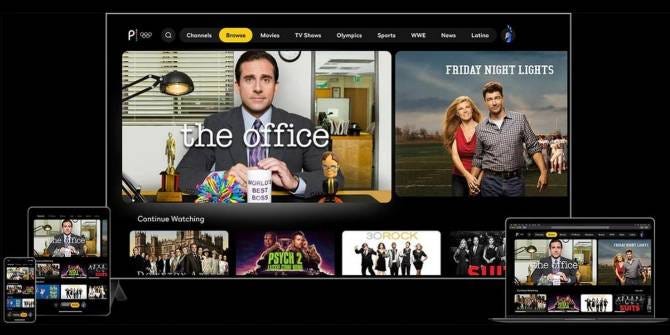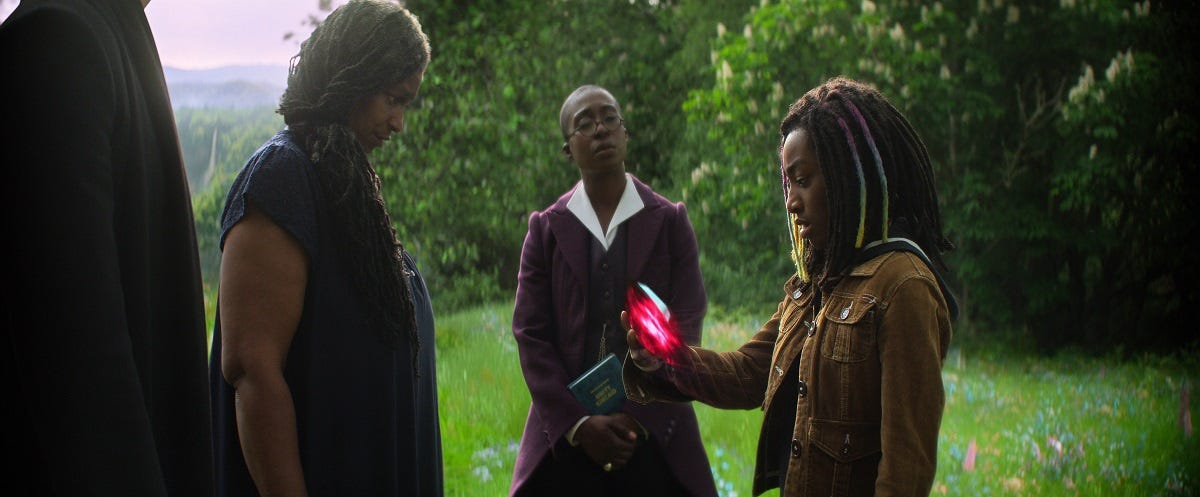Too Much TV: Your TV Talking Points For Monday, August 1st, 2022
The streaming video business is just like every other business. Just not in the way you think.
Here's everything you need to know about the world of television for Monday August 1st, 2022.
PROGRAMMING NOTE
There won't be a newsletter Tuesday. My son is getting some medical stuff done (nothing serious) and I am mostly going to be offline being a Dad. I'll be back Wednesday.
NEWSNATION IS THE OPPOSITE OF WHATEVER 'WOKE' IS
Following news last week that the fledgling cable news channel NewsNation has hired former CNN primetime anchor Chris Cuomo, comes word from The Daily Beast weekly media newsletter Confider that the network is considering also offering a primetime slot to disgraced former Fox News Channel primetime host Bill O'Reilly:
NewsNation is apparently not done stacking its roster with media men accused of misconduct. Bill O’Reilly is in talks to join the fledgling cable channel five years after he was fired by Fox News following an avalanche of sexual-harassment allegations, Confider has learned. NewsNation bosses are negotiating with the disgraced broadcaster to join as a contributor, two people familiar with the situation said. O’Reilly has already appeared several times as a guest on Dan Abrams’ nightly NewsNation show, including one hit in which he boasted about the “millions and millions of viewers and billions of dollars” he brought in for Fox News during his two-decade run as the king of the network’s primetime lineup. O’Reilly’s TV comeback means NewsNation would have three high-profile men accused of sexual harassment on its payroll. Chris Cuomo, who announced his NewsNation hiring last week, was accused of sexual harassment amid his CNN downfall last fall, and former Good Morning America exec producer Michael Corn, now president of NewsNation, was accused of sexually assaulting two junior ABC News staffers. A NewsNation spokesperson declined to comment while a rep for O’Reilly did not respond to multiple requests for comment.
Well, if NewsNation is looking for someone to do commentaries, I hear Garrison Keillor is still available.
THE STREAMING BUSINESS IS LIKE EVERY OTHER BUSINESS, JUST NOT IN THE WAY YOU THINK
One of the more popular topics for streaming TV industry hot takes are variations of the "why does Netflix release so many terrible high-budget movies?" There was another piece being passed around social media today and I'm not going to point to it because this isn't specifically about that article. But it makes the point that is often repeated in these screeds. That Netflix spends too much money on things that aren't big hits and aren’t particularly entertaining.
My glib answer is that if anyone in Hollywood could figure out a way to up their percentage of original content that doesn't suck, they'd be billionaires. But as anyone who has worked in the trenches of television can tell you, no one knows for sure.
I was reading a piece today by Morgan Housel, who discusses similar financial uncertainties in the word of Venture Capital, and many of his thoughts sound very familiar to those of us who cover the streaming video sector on a daily basis:
Venture capital is a tail-driven business. You’ve likely heard that. Make 100 investments, and almost all of your return will come from five of them; most of your return from one or two.
Correlation Ventures crunched the numbers. Out of 21,000 venture financings from 2004 to 2014, 65% lost money. Two and a half percent of investments made 10x-20x. One percent made more than 20x return. Half a percent – about 100 companies – earned 50x or more. That’s where the majority of the industry’s returns come from. It skews even more as you drill down. There’s been $482 billion of VC funding in the last ten years. The combined value of the ten largest venture-backed companies is $213 billion. So ten venture-backed companies are valued at half the industry’s deployed capital.
One of the examples he gives for this investing challenge comes from the early days of the Disney Company:
Steamboat Willie put Walt Disney on the map as an animator. Business success was another story. Disney’s first studio went bankrupt. Later cartoons were monstrously expensive to produce, and financed at onerous terms. By the mid-1930s Disney had produced more than 400 cartoons – most of them short, most of them liked, and most of them losing money. Disney and his studio were nearly broke.
Snow White and the Seven Dwarfs changed everything. The $8 million it earned in the first six months of 1938 was an order of magnitude higher than anything the studio earned previously. It transformed Disney Studios. All company debts were paid off. Key employees got retention bonuses. The company purchased a new state-of-the-art studio in Burbank, where it remains today. By 1938 Walt had produced several hundred hours of film. But in business terms, the 83 minutes of Snow White was pretty much all that mattered.
As Housel notes, it’s always like this, no matter what the industry:
J.P. Morgan Asset Management published the distribution of returns for the Russell 3000 from 1980 to 2014. Forty percent of all Russell 3000 stock components lost at least 70% of their value and never recovered. Effectively all of the index’s overall returns came from 7% of components. That’s the kind of thing you’d associate venture capital. But it’s what happened inside your grandmother’s index fund.
These trends are also why it is so hard for a company (or for our purposes, a streamer) to turns things around when it's flailing strategically:
Extreme winners and losers emerge faster in VC than other investment styles. But extremes are the norm, everywhere. Great ideas and great execution are rare. Most competitive fields have strong feedback loops: Losers keep losing because no one wants to be associated with losers, and winners keep winning because winning opens doors, and open doors beget more open doors. Amazon is successful in part because it has cheap capital, and it has cheap capital because it’s successful. Sears, on the other hand, has virtually no shot at redemption. In many industries, customers do not want the fifth-best product. Talented employees don’t want the fifth-best employer. They want the best. So winning accrues to just a few. It’s as true for large companies as it is for startups, even if the latter happens faster.
A takeaway from that is that no matter what you’re doing, you should be comfortable with a lot of stuff not working. It’s normal. This is true for companies, which need to learn how to fail well. It’s true for investors, who need to understand both the normal tail mechanics of diversification and the importance of time horizon, since long-term returns accrue in bunches. And it’s important to realize that jobs and even entire careers might take a few attempts before you find a winning groove That’s how these things work.
This is the challenge faced by a streamer such as Peacock. It's not that it's a disaster, but based on subscriber numbers, it's struggling to find a pathway to growth. While Comcast is willing to spend billions on sports rights, the original content production continues to be erratic. And that's a problem if you are competing in a sector where there are likely to be 3-4 "winners." Spending billions of dollars to be number 5 or 6 in the streaming world is the equivalent of not existing. It's hard to convince people to subscribe if they don't see your service as a viable option.
One last thing about the "Netflix makes too many over-priced mediocre movies" trope. Yes, some of the films are disappointing and certainly when you're spending $200 million on a film that is exclusive to streaming, you are going to lose money. But in some cases, these movies are the victims of an insular world of critics that tend to suffer a bit from group think in the same way that Beltway-based political reporters all begin to sound alike. Living in Minnesota and surrounded by civilians, I'm often struck by how different average viewers see some of these big action films. They aren't factoring industry trends or production costs into the viewing experience. They simply care whether or not they were entertained and that is a very different metric than one used by veteran entertainment news journalists.
Also, while it's financially messy, the only way to build is some viable IP that can exploited is by creating a lot of stuff. There's nothing wrong with that in theory, but the real question about Netflix is how effectively are they learning from the misses?
That learning curve is the difference between success and failure in any industry.
COMING THIS WEEK
Here is a rundown of streaming and linear TV highlights for this week. All of these will be reviewed at AllYourScreens. The titles marked with a "*" are ones where I have received an advance screener and the review will post the day of the premiere. If I didn't have a screener, a review will typically be up in 24-48 hours and I'll link to the reviews in the following day's newsletter:
Monday, August 1st:
Big Tree City Series Premiere (Netflix)
Industry Season Premiere (HBO)
*Snake In The Grass Series Premiere (USA)
Tuesday, August 2nd:
* Clusterf**k: Woodstock ’99 (Netflix)
The Hillside Strangler: Devil In Disguise (Peacock)
Wednesday, August 3rd:
Buba (Netflix)
*Reservation Dogs Season Two Premiere (FX)
Thursday, August 4th:
*Alone: The Skills Challenge Series Premiere (History)
*Good Grief Season Two Premiere (Sundance)
Lady Tamara (Netflix)
*Mike Judge's Beavis And Butt-Head Series Premiere (Paramount+)
Super Giant Robot Brothers (Netflix)
* Tracker’s Diary: Bears Of Katmai (CuriosityStream)
What Josiah Saw (Shudder)
Friday, August 5th:
Carter (Netflix)
* Lego Star Wars: Summer Vacation (Disney+)
* Luck (Apple TV+)
Prey (Hulu)
*Recipe Lost & Found Series Premiere (Magnolia/Discovery+)
Rise Of The Teenage Mutant Ninja Turtles: The Movie (Netflix)
* Stowaway (AMC+)
The Sandman Series Premiere (Netflix)
* Thirteen Lives (Prime Video)
Saturday, August 6th:
* Capturing Home Series Premiere (Discovery+/Magnolia)
* Love In The Limelight (Hallmark)
Reclaim (Netflix)
* Red Election Series Premiere (Ovation TV)
* The Art Of Vintage Series Premiere (Discovery+/Magnolia)
TWEET OF THE DAY
ODDS AND SODS
* Cinema Paradiso will be a 6-episode TV series developed by Rome-based producer Marco Belardi. He is currently in the US negotiating with a yet-to-be-named US streaming service. The show will be filmed and delivered in 2023, with the plot reflecting that of the film, only with the backstories of the characters fleshed-out.
* NBC has picked up the Jane Lynch-hosted game show The Weakest Link for a third season.
* AMC Networks has ordered a second season of the AMC+ exclusive series Moonhaven ahead of its season one finale on August 4th.
* Episodes of Dr. Quinn, Medicine Woman are coming To FETV on September 24th.
WHAT'S NEW FOR MONDAY
Here's a quick rundown of all the new stuff premiering today on TV and streaming:
Big Tree City (Netflix)
Flip To A Million Series Premiere (HGTV)
Game Of Spy (Prime Video)
Industry Season Two Premiere (HBO)
Inside Out Season Premiere (HGTV)
People Magazine Presents: Crimes Of The 90s Series Premiere (Investigation Discovery)
Shark Bait (Tubi)
Snake In The Grass Series Premiere (USA)
Click Here to see the list of all of the upcoming premiere dates for the next few months.
SEE YOU WEDNESDAY!
If you have any feedback, send it along to Rick@AllYourScreens.com and follow me on Twitter @aysrick.





